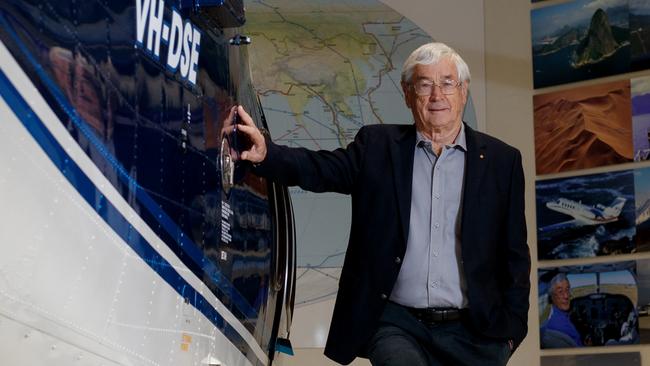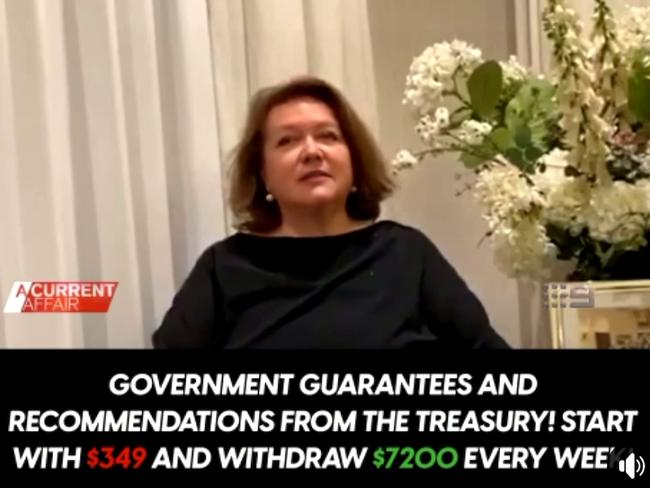Deep fake video scam using entrepreneur Dick Smith and Treasurer Jim Chalmers targets Australians
A new generation of scam ads using deep fake videos of entrepreneur Dick Smith, Jim Chalmers and other prominent Australians has hit Facebook.

Facebook has been condemned by one of the nation’s most prominent business figures for failing to stop a new generation of scam ads that use deep fake videos of him and other high-profile Australians “endorsing” fraudulent investments.
Electronics entrepreneur Dick Smith, who has been trying for more than two years to stop Facebook running scam ads with his identity, said it was the first time he was aware of being used in deep fake videos.
One fraudulent video purports to be a news segment on A Current Affair and includes “interviews” between host Allison Langdon and Jim Chalmers, Mr Smith and billionaires Gina Rinehart and Andrew Forrest.
Mr Smith said even he was fooled while watching himself spruik the scam investment.
“When I first saw myself, I thought ‘Oh, they’ve got some other interview that they have cut apart and it’s me talking’,” he said.
“But then I realised that they’ve actually lip-synched completely new text, new voice in it.
“I’ve never said any of that stuff. They are incredibly well done. I think it’s very worrying.”

Mrs Rinehart has personally written to Meta chief executive Mark Zuckerberg over the failure to stop scams on his platforms Facebook and Instagram, The Australian revealed last week.
Mr Smith said he was in contact with Mrs Rinehart about what more they could do to prevent their identities being used to defraud Australians.
A record $3.1bn was lost to scams in 2022, according to the Australian Competition & Consumer Commission.

Mr Smith has previously written to Facebook to complain, and he did not want to “spend hundreds of thousands of dollars” on legal action.
“I shouldn’t need to do that. The company should be ethical,” he said.
“Facebook and Instagram could easily have a simple search which looks for something that has Dick Smith, Andrew Forrest and Gina Rinehart and just delete it, but they don’t even do that – they’re so greedy.”
Mr Smith believed he was targeted because of his credibility with the public.
“This is very new and a worsening situation. I’m more worried about the people that are losing the money. They’re believing what I’m saying, but it’s fake.”
Cybertrace chief executive and online fraud investigator Dan Halpin said deep fake scams involving the use of artificial intelligence had “reached unprecedented levels of realism”.

“We’ve always known realism in deep fake videos would improve but I was surprised by how quickly it has come to Australia,” Mr Halpin said.
“It shows the level of sophistication and professionalism of the scammers.”
Affiliate marketers produced scam ads then on-sold victims’ details to international organised crime groups to defraud them, Mr Halpin said.
Mr Smith said while some parts of the scam videos circulating were glaringly fake, it would soon be impossible to tell what was real.
“I’m a technologist, I’ve made my money out of electronics, but this has gone so far now,” he said.
“You could have the same people doing one of the prime minister saying that we’re declaring war and many people would believe it.”
It was Meta’s responsibility to stop the scam ads circulating on Facebook and Instagram, Mr Smith said.
“If I try and run an ad in The Australian newspaper, the editorial staff or someone looks at that ad.
“I’ve had times where I’ve had ads that have been rejected, because the publisher knows that it will be held liable if I put something that’s defamatory or that’s fraudulent in an ad.
“Facebook and Instagram are not doing that. They don’t have the cost of checking. I believe eventually they’ll be forced to make sure that each advertisement is checked.”
A Meta spokeswoman said the company “is constantly tackling scams through a combination of technology such as new machine learning techniques and specially trained reviewers”.






To join the conversation, please log in. Don't have an account? Register
Join the conversation, you are commenting as Logout